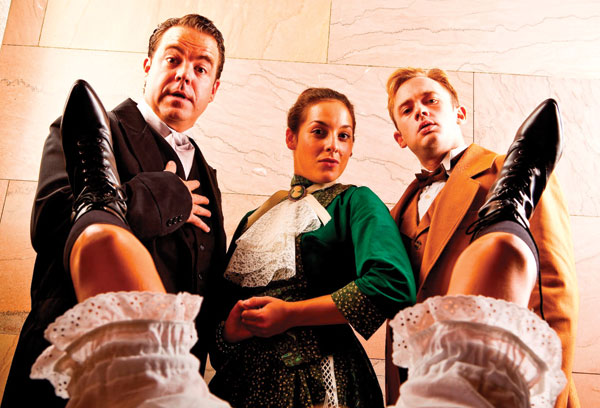The ultimate stage mom gets her turn — and it’s a good one — at Lyric; a doctor rubs women the wrong way in Kitchen Dog’s ‘Vibrator Play’
ARNOLD WAYNE JONES | Life+Style Editor
jones@dallasvoice.com
……………………
ON THE BOARDS
IN THE NEXT ROOM at The MAC, 3120 McKinney Ave. Through Oct. 8. KitchenDogTheater.org
GYPSY at Irving Arts Center, 3333 MacArthur Blvd., Irving. Through Sept. 18. LyricStage.org.
…………………….
The puns for In the Next Room, or the Vibrator Play, now setting off sparks at The MAC courtesy of Kitchen Dog Theater, practically write themselves: “Stimulating!” “Probing!” “Certain to rub some people the wrong way.” But it’s the less-obvious appeal of the play, and its unexpected and abiding humor, that makes all of those jokes accurate descriptions of a naughty but thoughtful comedy of manners.
Oscar Wilde it ain’t — it is, rather, Sarah Ruhl, a MacArthur “Genius” Fellow who’s an acquired taste. Her brand of theatrical realism is difficult to pin down. The full title for this play sounds both ominous and dirty, but, at least in this version, it is neither. In fact, trying to pigeonhole it in any way is a fool’s errand. It’s a proudly feminist screed fulminating against male-dominated society while retaining nuance. It is sui generis: A woman-centric sex farce with lesbian overtones.
In the 1880s, after the Civil War and at the dawn of the age of Edison, women are still hemmed in by Victorian values even as modernity threatens to break them free. For Catherine Givings (Martha Harms), the electrification of her home, quite literally, turns a light on for her. She’s bored with her husband (Max Hartman), a scientist of some kind who becomes known around town for treating women suffering from “hysteria,” a blanket term for any female who seems remotely dissatisfied with her life. How could any girl in her 20s, married to a man in his 40s and living in comparative luxury be anything other than content? Marc Cherry didn’t invest desperate housewives; society did that generations ago.
Dr. Givings’ treatment, discussed with clinical detachment, includes a new-fangled device made possible by electricity: It stimulates the vulva, releasing the “pent up juices” that “congest” the female body and mind.
Basically, he’s masturbating clients while their husbands wait in the next room, happily paying for a service they could perform for free if only they’d open their eyes.
A lot of the humor comes from the disconnect between Givings’ therapies and the ecstatic rapture he induces in his patients, none more dramatically than Mrs. Daldry (Catherine DuBord). A modern doctor would easily diagnose Mrs. Daldry with post-partum depression … at least until noticing that she seems to get her “juices” released better when Givings’ nurse Annie (Kristin McCollom) performs the service by hand.
The play takes its most raucous turn when Dr. Givings is visited by a Leo (Austin Tindle). Male hysterics are rare, the doc notes, though it is more common among Bohemian types. He then proceeds to treat his patient by “massaging the prostate” with a cigar-shaped version of the vibrator, which Leo enjoys more than the supporting cast in a Falcon video.
Such absurdism — can the men truly be so ignorant? — clicks alongside some potent observations about how women are made neurotic by well-intentioned oppression, and about how homosexuality basically among men and women is best dealt with by ignoring it. The style is both scathing and sexy, funny and poignant. Just as Mrs. Daldry explores her incipient lesbianism, she’s arrested in her burgeoning self-awareness by societal norms. (In some ways, not much has changed.)
Comedies about onanism in which people have onstage orgasms may seem like a hard sell, but director Jonathan Taylor makes it all work without digressing into lurid potty humor. He teases well-crafted performances from the entire cast, all of whom combine a modern perspective with a comfort level with the 19th century idiom … which is to say, not all that comfortable. That’s kind of the point.
There has probably never been a better book-musical written for the American musical theater than Gypsy, which Lyric Stage has mounted, as has been its wont in recent seasons, with a full 39-piece orchestra and magnificent sets and costumes (the clothes were actually bought from the recent Broadway revival with Patti LuPone).
Set in the world of Vaudeville, it’s the perfect meta-play: A show about show people for show people. Hard-driving stage mom Rose Hovick (Sue Mathys) pushes her daughters into show business as kids: One will eventually become B-movie actress June Havoc; one the legendary ecdysiast Gypsy Rose Lee. But until then, they were just Shirley Temple wannabes schlubbing around the Orpheum circuit during the last gasps of Vaudeville.
The songs, by Jule Styne and Stephen Sondheim, are classics: “Everything’s Coming Up Roses,” “Small World,” “Some People,” “Rose’s Turn.” Just the names can give a theater queen chills. Still, music director Jay Dias could add a little more tempo to some of the numbers. “All I Need is the Girl” needs to sparkle as lightly as champagne bubbles, and charming as the number is here, it could have more energy.
But who’s gonna complain too much, when you get to hear these gorgeous numbers as they are meant to be, by a stellar cast. Mary McElree makes a convincing transition from mousy Louise to sophisticated seductress Gypsy Rose, and Sara Shelby-Martin steals her scene as Miss Mazeppa. But this is largely Mathys’ show: She’s short but firm, with the low center of gravity shared by all great male movie heavies. Her pipes are powerful but her acting is even better. You believe her mania even as you hold her in contempt. There’s real magic in that.
This article appeared in the Dallas Voice print edition September 16, 2011.

















